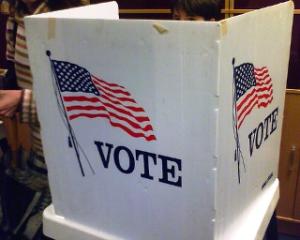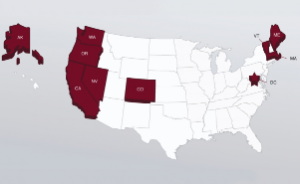It's been long enough to begin to be able to measure what happens when marijuana is legalized. Things will continue to evolve, but so far the picture is pretty bright.
Medical marijuana is safe from the Justice Department for another few days, governors in New Jersey and Rhode Island make noises about expanding medical marijuana programs, Georgia voters are ready for a full-fledged medical marijuana law, and more.
The Baltimore cop who accidentally recorded himself planting drugs gets indicted, two Indiana jail guards go down in separate cases in two days, a Pennsylvania probation officer gets in trouble for trying to win sexual favors, and more.
StoptheDrugWar.org has internships this semester and following in foreign policy, legislative advocacy, writing, nonprofit administration, and technical work.
Vermont becomes the 9th legal marijuana state, Illinois lawmakers take up legalization, the US Sentencing Commission proposing increasing fentanyl penalties, and more.
Trump renews the opioid crisis emergency even as an opioid commission member calls it "a sham," things are looking up for Michigan marijuana legalizers, the French parliament will take up drug decriminalization, and more.
More than a million Floridians would regain their right to vote in November after an initiative qualified for the ballot, California small pot growers sue to stop concentration in the industry, New York City sues opioid manufacturers and seeks half a billion in damages, and more.
It's the time of year for marijuana to start popping up in state legislatures, Rhode Island's governor proposes expanding the state's medical marijuana system, Trump's wet-behind-the-ears deputy drug czar is stepping down, a new poll finds support for criminal justice reforms, and more.
The great social experiment that is marijuana legalization is now five years old, with six states already allowing legal marijuana sales, two more where legal sales will begin within months, and yet another that, along with the District of Columbia, has legalized personal possession and cultivation of the herb.
As a number of state legislatures -- including Connecticut, Delaware, New Hampshire, New Jersey, New Mexico, and New York -- seriously contemplate joining the parade this year, it's more important than ever to be able to assess just what impact marijuana legalization has had on those states that have led the way.
The prophets of doom warned of all manner of social ills that would arise if marijuana were legalized. From hordes of dope-addled youths aimlessly wandering the streets to red-eyed carnage on the highway, the divinations were dire.
So far at least, they were wrong. And while things will doubtless continue to evolve over the long term, as the industry matures, prices possibly drop, regulations change, and familiarity with legal marijuana grows, so far things are looking pretty encouraging. A report released Tuesday by the Drug Policy Alliance, From Prohibition to Progress, takes a long look at what has happened in the states have legalized it:
1. Marijuana arrests plummeted.
Well, of course. If there's one thing you could predict about legalizing marijuana, this is it. The decline in the number of pot arrests is dramatic: 98% in Washington, 96% in Oregon, 93% in Alaska, 81% in Colorado, 76% in DC. That means tens of thousands of people not being cuffed, hauled away, and branded with lifelong criminal records, with all the consequences those bring.
The savings in human dignity, liberty and potential are inestimable, but the savings to state criminal justice and correctional systems are not: The report puts them at hundreds of millions of dollars.
2. …But the racial disparities in marijuana arrests have not ended.
While marijuana legalization dramatically reduces the number of people arrested for marijuana offenses, it clearly does not end racially disparate policing. The vast disparities in marijuana arrests remain, even in legal states. Black and Latino people remain far more likely to be arrested for marijuana offenses than white people, despite similar rates of use and sales across racial groups. There is work to be done here.
3. A tide of teenage weed heads is not unleashed upon the nation.
High school kids in the earliest legalization states smoke pot at rates similar to kids in states that haven't legalized it, and those rates have remained stable. In the later legalization states, rates of teen use vary widely, but have mostly stabilized or declined in the years leading up to legalization. And in those latest states -- Maine, Massachusetts, Nevada, California -- regulatory programs are either not yet in place or so new they're unlikely to have effected youth use rates.
4. The highways remain safe.
In the earliest legalization states, Colorado and Washington, the total number of arrests for driving under the influence of alcohol and other drugs is down, and the crash rates in both states are statistically similar to states that haven't legalized it. In fact, there seems to be no correlation between legalization and crash rates.
5. States with legal marijuana have lower rates of opioid-related harms.
In Colorado, an upward trend in overdoses began to decline after 2014, the first year of retail pot sales in the state. Other positive indicia come from medical marijuana states, which report a nearly 25% drop in overdose death rates, a 23% reduction in opioid addiction-related hospitalizations and a 15% reduction in opioid treatment admissions.
6. Marijuana tax revenues are big -- and bigger than predicted.
Legalization states have collected more than a billion dollars in pot tax revenues -- and that's not counting the monster market in California, where recreational sales just began this month. Likewise, slow rollouts of taxed and regulated marijuana commerce in Maine and Massachusetts, mean no tax dollars have yet been generated there. In the states that do have legal pot sales, overall sales and tax revenues quickly exceeded initial estimates.
7. Marijuana tax dollars are going for good things.
Like $230 million to the Colorado Department of Education in two years to fund school construction, early literacy, school health, and bullying prevention programs. Likewise, schools in Oregon get 40% of the pot taxes and schools in Nevada will get $56 million in wholesale pot tax revenues. Oregon also allocates 20% of pot taxes for alcohol and drug treatment, while Washington kicks in 25%. In Washington state, 55% of pot tax revenues fund basic health plans.
8. Legal marijuana is a job creation engine.
The legal marijuana industry has already created an estimated 200,000 full- and part-time jobs, and that's before California, Maine, and Massachusetts come online. As marijuana moves from the black market to legal markets, weed looks like a growth industry and job generator for years to come.
"Marijuana criminalization has been a massive waste of money and has unequally harmed black and Latino communities," said Jolene Forrman, staff attorney at the Drug Policy Alliance and author of the report. "This report shows that marijuana legalization is working. States are effectively protecting public health and safety through comprehensive regulations. Now more states should build on the successes of marijuana legalization and advance policies to repair the racially disparate harms of the war on drugs."
In addition to reforming police practices to reduce racial disparities, the report also says there is more work to be done on fostering equity within the marijuana industry and points to models for doing so, such as the California provision that having a prior drug conviction can't be the sole basis for denying a marijuana license.
Having places where people can actually smoke legal marijuana also remains an issue, the report noted. Public consumption is not allowed in any of the legal states. It's a ticketable offense in some and a misdemeanor in others. Public use violations are also disproportionately enforced against people of color, and the imposition of fines could lead to jail time for poor people unable to pay for the crime of using a legal substance.
And what about the kids? The report notes that while legalization has generally resulted in reducing historically high numbers of young people being stopped and arrested for pot offenses, these reductions are inconsistent, and in some circumstances, young people now comprise a growing percentage of marijuana arrests. A model could be California, where kids under 18 can only be charged with civil infractions.
Legalizing marijuana may be necessary for achieving social justice goals, but it's not sufficient for achieving them. As this report makes clear, how we legalize marijuana matters, and that's still a work in progress. But so far, it's looking pretty good.
back to top
Medical marijuana is safe from the Justice Department for another few days, governors in New Jersey and Rhode Island make noises about expanding medical marijuana programs, Georgia voters are ready for a full-fledged medical marijuana law, and more.
National
Last Thursday, a House version of a bill aimed at encouraging medical marijuana research was filed. Rep. Rob Bishop (R-UT) filed a House version of a bill aiming at encouraging medical marijuana research. Utah Sen. Orrin Hatch (R) filed the Senate version of the Marijuana Effective Drug Study Act, Senate Bill 1803, in the Senate in September.
On Monday, the congressional budget deal retained protections for state-legal medical marijuana. The short-term budget deal approved by Congress retains the Rohrabacher-Blumenauer amendment, which bars the Justice Department from using its funds to go after medical marijuana patients and operations in states where it is legal. But the continuing budget resolution is only in effect until February 8.
Georgia
Last Wednesay, a poll found voters were ready for a full-fledged medical marijuana program. A new poll from the Atlanta Journal-Constitution finds that more than three-quarters of those surveyed want to see the state's limited medical marijuana program expanded. Some 77% said they want greater access to medical marijuana. The poll comes as the legislature considers a measure, House Bill 645, that would allow for medical marijuana dispensaries. The poll also found that support for recreational marijuana was at an all-time high in the state, with 50% saying legalize it.
Indiana
On Tuesday, a Senate panel approved a CBD bill. The Senate Corrections and Criminal Law Committee voted 7-2 to approve Senate Bill 52, which would legalize CBD cannabis oil containing less than 0.3% THC. The state already has a CBD law, but that law is limited to epilepsy patients who are registered with the state. This bill would open up CBD use to anyone with a medical conditions.
On Thursday, the House called for a study of medical marijuana. The House voted unanimously in support of a resolution calling for a legislative committee to study medical marijuana. If the Senate concurs, a special council comprised of lawmakers from both parties would do the study over the summer.
Kentucky
On Wednesday, the House called on the feds to remove roadblocks to medical marijuana research. The House voted 73-5 to approve a resolution calling on the DEA and the FDA to "expedite research on the safety and effectiveness of the use of marijuana for certain health purposes."
New Jersey
On Tuesday, the governor ordered a review of the state's "constrained" medical marijuana program. Gov. Phil Murphy (D) ordered a 60-day review of the state's medical marijuana program, which he called "constrained." He said he would consider allowing home deliveries, allowing purchases beyond the current two-ounce limit, and expanding the number of dispensaries, but he did not mention expanding the list of qualifying medical conditions.
Pennsylvania
Last Wednesday, the state's first dispensary opened for business. Keystone Canna Remedies had its grand opening in Bethlehem -- but it doesn't actually have any product to sell. The dispensary said it will be doing educational workshops until it gets its first shipments of medical marijuana next month.
Rhode Island
On Wednesday, the governor proposed expanding the medical marijuana program. As part of her 2018-2019 budget plan, Gov. Gina Raimondo (D) is proposing quadrupling the number of dispensaries in the state from three to 12, adding "acute pain" to the list of qualifying conditions, and allowing Connecticut and Massachusetts cardholders to buy medical marijuana in the state.
Tennessee
Last Friday, a CBD medical marijuana bill was filed. A pair of Republican lawmakers have filed the Medical Cannabis Only Act, which would legalize the use of cannabis oil products, but not edibles or raw marijuana. The bill is not yet available on the legislative web site.
[For extensive information about the medical marijuana debate, presented in a neutral format, visit MedicalMarijuana.ProCon.org.]
back to top
The Baltimore cop who accidentally recorded himself planting drugs gets indicted, two Indiana jail guards go down in separate cases in two days, a Pennsylvania probation officer gets in trouble for trying to win sexual favors, and more. Let's get to it:
In Los Angeles,
a Los Angeles County sheriff's deputy was arrested last Tuesday on charges he was taking big bucks to transport drugs. Deputy Kenneth Collins had taught life skills to the formerly incarcerated and it is with one of his former students that he allegedly conspired to transport 45 pounds of cocaine and 15 pounds of meth from Los Angeles to Las Vegas in return for $250,000. Alas for Collins, it was a sting, and he was arrested near the Rose Bowl following two other faked drug transports. He and three others are charged with suspicion of conspiracy to distribute controlled substances.
In Westville, Indiana, a Westville Correctional Facility guard was arrested last Saturday for allegedly attempting to smuggle drugs and tobacco into the jail. Officer Paul Farkas went down when a before-work search uncovered a pack of cigarettes containing heroin and cocaine. He is charged with trafficking a controlled substance.
In Logansport, Indiana, a Miami County Correctional Facility guard was arrested Monday on charges she was smuggling drugs into the jail. Guard Heaven Fair went down after authorities received a tip she was trafficking drugs and pulled her over in her car. The Cass County Drug Task Force recovered 164 suboxone strips on her person and 29 grams of meth at her home. She is charged with dealing meth, possession of meth, maintaining a common nuisance, dealing in a schedule III substance and possession of a schedule III substance.
In Gettysburg, Pennsylvania, a former Adams County probation officer was arrested Tuesday for fabricating drug test results of a probationer as part of an effort to get into her pants. Wyatt Mowery, 23, sent inappropriate text messages to the woman and tried to persuade her to have an intimate relationship with him. He is charged with 10 misdemeanor counts of records and evidence tampering and obstruction of law.
In Baltimore, a Baltimore police officer was indicted Wednesday by a federal grand jury after public defenders several months ago released a body camera video they said showed him planting drugs in an empty soup can. Officer Richard Pinheiro now faces federal charges of fabricating evidence and official misconduct. The video shows an officer appearing to put the can in a trash-strewn lot, then call his fellow officers over as he pretends to discover the stash.
back to top
StoptheDrugWar.org is interviewing for the spring 2018, summer 2018, and fall 2018 semesters. We currently have internships in the following areas:
Along with our current internship listings, please visit https://stopthedrugwar.org/about, https://stopthedrugwar.org/global and https://stopthedrugwar.org/philippines to learn about our organization and our current projects and campaigns.
Please feel free to contact us for further information, and thank you for your interest.
back to top
Vermont becomes the 9th legal marijuana state, Illinois lawmakers take up legalization, the US Sentencing Commission proposing increasing fentanyl penalties, and more.

Vermont just turned New England a little greener. (Wikimedia)
Another National Poll Has a Strong Majority for Marijuana Legalization. A new poll from NBC News and the Wall Street Journal has support for marijuana legalization at 60% nationwide, up from 55% the last time the media outlets asked the question, in 2014.
Illinois Lawmakers Hold Hearing on Marijuana Legalization. A joint legislative committee began a hearing on marijuana legalization Monday morning. Cook County Board President Toni Preckwinkle told legislators she supported it: "Legalizing marijuana is an important step in right-sizing our criminal justice system, reducing racial disparities in prosecuting non-violent drug offenses, targeting our scarce resources on prosecuting violent crime and lessening the social dislocation we see in too many of our communities," Preckwinkle said. The only relevant bill currently before the legislator is Senate Bill 2275, which would authorize a non-binding statewide referendum on the topic of legalization.
Vermont Legalizes Marijuana; Becomes First State to Do So Via Legislative Process. With Gov. Phil Scott's (R) signature on House Bill 511 Monday, the state legalized the possession and cultivation of small amounts of marijuana, becoming the first state to free the weed via the legislature. The new law goes into effect July 1. The new law does not legalize the taxed and regulated commercial production and sale of marijuana. Instead, the bill calls for a task force appointed by the governor to study the issue and recommend "legislation on implementing and operating a comprehensive regulatory and revenue system for an adult marijuana market" by December 31. Then lawmakers would have to go to work again to get that passed.
Buffalo Campaigners Call for Police to Deprioritize Marijuana Possession Arrests. A nonprofit group called Open Buffalo has begun a petition campaign to urge Mayor Byron Brown to tell the police department to deprioritize enforcement of marijuana possession laws. The group is close to its goal of 600 signatures; when it hits that goal, it will deliver the petition to the mayor.
Sentencing
US Sentencing Commission Proposes Stiffening Fentanyl Penalties. Last Friday, the Sentencing Commission announced it was proposing to increase penalties for fentanyl offenses by setting the offense level for fentanyl equal to the higher offense level currently assigned to fentanyl analogs. The commission is also proposing a sentencing guidelines enhancement for misrepresenting fentanyl or fentanyl analogs as another substance. The commission also proposed a class-based approach to synthetic cathinones and cannabinoids and established a single marijuana equivalency for each class. Public comment on the proposals is open until March 6, and the commission will hold public hearings in February and March. The commission is expected to vote on the proposals before May 1.
back to top
Trump renews the opioid crisis emergency even as an opioid commission member calls it "a sham," things are looking up for Michigan marijuana legalizers, the French parliament will take up drug decriminalization, and more.

Presidential opioid commission member Patrick Kennedy calls it "a sham" and "a charade." (nationalcouncil.org)
Michigan Poll Has Strong Support for Legalization. A new Detroit News-Local 4 poll finds that 56.6% of respondents support a marijuana legalization initiative that is likely to be on the November ballot. The initiative from the Michigan Coalition to Regulate Marijuana Like Alcohol has already handed in signatures and is awaiting verification of signature validity by state officials.
Medical Marijuana
Congressional Budget Deal Retains Protections for State Legal Medical Marijuana. The short-term budget deal approved by Congress Monday retains the Rohrabacher-Blumenauer amendment, which bars the Justice Department from using its funds to go after medical marijuana patients and operations in states where it is legal. But the continuing budget resolution is only in effect until February 8.
Indiana Senate Panel Advances CBD Bill. The Senate Corrections and Criminal Law Committee voted 7-2 Tuesday to approve Senate Bill 52, which would legalize CBD cannabis oil containing less than 0.3% THC. The state already has a CBD law, but that law is limited to epilepsy patients who are registered with the state. This bill would open up CBD use to anyone with a medical conditions.
New Jersey Governor Orders Review of State's "Constrained" Medical Marijuana Program. Gov. Phil Murphy (D) Tuesday ordered a 60-day review of the state's medical marijuana program, which he called "constrained." He said he would consider allowing home deliveries, allowing purchases beyond the current two-ounce limit, and expanding the number of dispensaries, but he did not mention expanding the list of qualifying medical conditions.
Heroin and Prescription Opioids
Trump Administration Extends Opioid Emergency. The Trump administration has announced a 90-day extension of its declared opioid crisis emergency. The emergency was set to expire Tuesday. But the administration has done little to demonstrate it takes the crisis seriously. It has allocated no new funds, failed to launch a public awareness campaign, and has left key drug policy positions unfilled.
Trump's Opioid Commission is a "Sham," Member Says. Former Democratic Rep. Patrick Kennedy has called the commission "a sham" and "a charade" in an interview with CNN. "This and the administration's other efforts to address the epidemic are tantamount to reshuffling chairs on the Titanic," said Kennedy. "The emergency declaration has accomplished little because there's no funding behind it. You can't expect to stem the tide of a public health crisis that is claiming over 64,000 lives per year without putting your money where your mouth is."
Drug Testing
Nebraska Bill Would Require Drug Tests for Unemployment Benefits. State Sen. Joni Albrecht (R-Thurston) has filed Legislative Bill 712, which would allow some people seeking unemployment benefits to be drug tested. Failure to take or pass a drug test would make the person ineligible for benefits until he or she passes the drug test. Albrecht said she filed the bill on behalf of employers who want a drug-free work force. The bill got a hearing Monday, but no action was taken.
South Dakota Bill Would Require Drug Tests for Lawmakers. State Rep. Tim Goodwin (R-Rapid City) has filed a bill, House Bill 133, that would require all legislators to undergo drug tests within two weeks of being sworn into office. A positive drug test or a refusal would be reported to the presiding officer of the lawmaker's chamber for discipline. The move comes as the legislature ponders harsher penalties for meth offenses, and Goodwin said Tuesday that if lawmakers want to send people to prison for "a long period of time, we should all be clean ourself [sic]."
International
France Parliamentary Report Recommends Decriminalizing All Drug Use. A new parliamentary report is recommending a pair of options for modernizing the country's drug laws, including the decriminalization of drug use and possession. One proposal calls for fining drug possessors and charging them with a crime if they don't pay the fine. The other proposal calls for drug use and possession to be downgraded to a civil offense ("la contravention"), with fines, but no possibility of a criminal charge. Parliament will now have to decide which approach it wants to take.
Russian Presidential Candidate Calls for Marijuana Legalization. Presidential candidate and former reality TV star Ksenia Sobchak is calling for the legalization of marijuana. She said legalizing weed could help solve "the narcotics epidemic" in the country. "I myself don't use it, but I don't drink vodka by the bottle, either," she told state-run RIA Novosti news agency. "I don't really understand why drinking vodka in enormous quantities is considered normal in our country, but using marijuana is not, though it has far fewer consequences, even from the perspective of crime statistics," she added.
back to top
More than a million Floridians would regain their right to vote in November after an initiative qualfied for the ballot, California small pot growers sue to stop concentration in the industry, New York City sues opioid manufacturers and seeks half a billion in damages, and more.

A Florida initiative that would restore the voting rights of felons is headed for the November ballot. (Wikimedia)
California Growers' Group Sues to Block Huge Grow Operations. The California Growers Association, which represents small marijuana cultivators, filed suit in Sacramento Tuesday to block state rules it fears could open the way for huge commercial marijuana operations, driving its members out of business. Although the state has put a moratorium on large marijuana grows, state regulators are allowing businesses to acquire an unlimited number of licenses for smaller grows, which could lead to monopolization of the industry and have "a devastating effect" on small growers.
Maine GOP, Governor Seek to Delay Legalization Implementation. Tea Party Gov. Paul LePage (R) and legislative Republican leaders said Tuesday they want to extend a moratorium on the launch of legal pot businesses in the state until January 2019 and they will refuse to support a bill now before lawmakers that would extend the moratorium only until April 18. Voters approved marijuana legalization in November 2016. The proposed April 18 moratorium bill was unanimously approved by the Marijuana Legalization Implementation Committee last week, and is likely to come up for a vote Thursday on the Senate floor.
Massachusetts Marijuana Sanctuary State Bill Filed. Last Friday, Reps. Dave Rogers (D-Cambridge) and Mike Connolly (D-Cambridge) filed a bill that would prevent state and local authorities from cooperating with federal authorities attempting to enforce federal marijuana laws against state-legal marijuana businesses. The Refusal and Compliance Act would prevent police from handing over people in compliance with state marijuana laws unless federal authorities have a warrant.
Medical Marijuana
Another Utah Poll Shows Strong Support for Medical Marijuana Initiative. A new poll from the Salt Lake Tribune and the University of Utah's Hinckley School of Politics has support for a proposed medical marijuana initiative at 76%. That's nearly identical to the 75% approval polled in October. The poll comes as the Utah Patients Coalition, which is sponsoring the initiative, moves toward completing its signature-gathering campaign.
Heroin and Prescription Opioids
New York City Sues Big Pharma Over Opioid Crisis. The city filed suit against a handful of opioid manufacturers Tuesday in Manhattan Supreme Court. The lawsuit aimed at "corporate drug pushers" seeks $500 million from Johnson & Johnson, Cephalon, Purdue Pharma, Teva, and Janssen. The city saw more than a thousand opioid overdose deaths last year.
Asset Forfeiture
Alabama Asset Forfeiture Reform Bill Filed. Rep. Arnold Moore filed a bill Tuesday to curb the widespread use of civil asset forfeiture. House Bill 287 would effectively end civil asset forfeiture by requiring a criminal conviction before seizing someone's property.
Harm Reduction
Philadelphia Takes Step Toward Approving Safe Injection Sites. City officials announced Tuesday that they would allow a safe injection site as part of an effort to stem the rising tide of opioid overdose deaths. The city won't operate the site itself, but is now preparing to solicit operators interested in setting up such a site. There are no sanctioned safe injection sites in the US, although a number of other cities, including Denver, New York, San Francisco, and Seattle are considering them.
Voting Rights
Florida Initiative to Restore Voting Rights to Felons Qualifies for Ballot. The Voting Restoration Amendment, which would restore voting rights to more than a million Floridians with felony records, has qualified for the November ballot. Campaigners led by Floridians for Fair Democracy gathered more than the 799,000 valid voter signatures to qualify, state figures showed Tuesday. Because it is a constitutional amendment, the measure will need 60% of the vote to pass.
back to top
It's the time of year for marijuana to start popping up in state legislatures, Rhode Island's governor proposes expanding the state's medical marijuana system, Trump's wet-behind-the-ears deputy drug czar is stepping down, a new poll finds support for criminal justice reforms, and more.

Rhode Island Gov. Gina Raimondo (D) wants to quadruple the number of dispensaries in the state. (Wikimedia)
US Senators and Reps Send Trump Letter Urging Respect for State Marijuana Laws. Some 54 US senators and representatives sent a letter Thursday to President Trump expressing their "urgent concern" about threats to legal marijuana states and urging him to uphold his campaign pledge to respect state marijuana laws.
Iowa Senate Subcommittee Advances Marijuana Sentencing Reform Bill. A Senate Judiciary Committee subcommittee has approved Senate File 342, which would reduce possession of five grams of marijuana or less from a serious misdemeanor to a simple misdemeanor. That would reduce possible jail time from a year to no more than 30 days and reduce fines from up to $1,000 to $65. The bill now goes before the committee as a whole.
New Mexico Marijuana Sentencing Reform Bill Filed. Sen. Joseph Cervantes (D-Las Cruces) has filed Senate Bill 141, which would reduce the penalties for the possession of small amounts of marijuana. Under the bill, people caught with less than an ounce would be subject to a fine of no more than $50 for a first offense and up to 15 days in jail. Possession would remain a misdemeanor. The Senate approved a similar bill last year, but it was never taken up in the House. Cervantes is seeking the Democratic gubernatorial nomination.
Medical Marijuana
Indiana House Calls for Study of Medical Marijuana. The House voted unanimously Thursday in support of a resolution calling for a legislative committee to study medical marijuana. If the Senate concurs, a special council comprised of lawmakers from both parties would do the study over the summer.
Kentucky House Calls for Feds to Remove Roadblocks to Marijuana Research. The House voted 73-5 Wednesday to approve a resolution calling on the DEA and the FDA to "expedite research on the safety and effectiveness of the use of marijuana for certain health purposes."
Rhode Island Governor Proposes Medical Marijuana Expansion. As part of her 2018-2019 budget plan, Gov. Gina Raimondo (D) is proposing quadrupling the number of dispensaries in the state from three to 12, adding "acute pain" to the list of qualifying conditions, and allowing Connecticut and Massachusetts cardholders to buy medical marijuana in the state.
Drug Policy
Trump's 24-Year-Old Deputy Drug Czar to Step Down. Taylor Weyeneth, the 24-year-old former Trump campaigner who was given a senior post in the White House Office of National Drug Control Policy (ONDCP -- the drug czar's office), will step down at the end of this month. Weyeneth's high-ranking position without any apparent qualifications for it, as well as the revelation that he had a habit of not showing up for work at a law firm where has was previously employed, aroused controversy earlier this month.
Sentencing
Poll Finds Broad Support for Reforming Criminal Justice System. A new Public Opinion Strategies poll finds that fully three-quarters of the American public believe the criminal justice system needs "significant improvements," with strong majorities in both parties in agreement on the issue. Similarly, strong majorities of both Democrats and Republicans don't want to spend money locking up nonviolent offenders and that the primary goal of the criminal justice system should be rehabilitation. Mandatory minimums for non-violent offenders are "toxic with voters across the political spectrum," the poll found, with 87% strongly supporting replacing them with a system that allows more judicial discretion.
back to top







